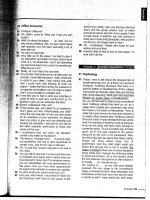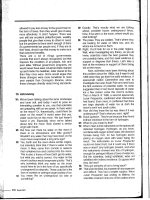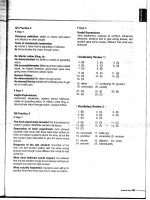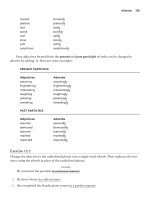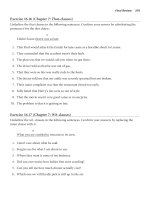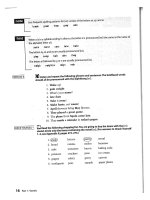ontapnguphap10 ppsx
Bạn đang xem bản rút gọn của tài liệu. Xem và tải ngay bản đầy đủ của tài liệu tại đây (267.44 KB, 8 trang )
O
n
t a ọ
p
H
où c
k ỡ I -
T
i e ỏ
ng A
nh
1
0
G.v:Dinh Ngoc Hieu.
1
ễN TP HC Kè I - MễN TING ANH 10 C BN
A /
A
c ce
nt
m a r
k: Du nhn/ Trng
õm
1.
i
vi nhng t gm cú 2 hoc 3 vn, trng õm thng ri v
o
v
n
ủ
u.
E x
: pộasant, spộcial, mộdia,
phútograph,
2.
i
vi nhng t gm cú 4 vn (hoc nhiu hn), trng õm thng ri vo vn th 3 k t
c u i.
E x
: geúgraphy, univộrsity, commỳnicate, technúlogy,
3.
i
vi nhng t tn cựng cú cỏc vn nh: -ion, -ic, -ian, trng õm thng ri vo v n
p h ớ a
t r
c.
E x
: profộssion, demonstrỏtion, scientớfic, photogrỏphic, musớcian, electrớcian,
4.
i
vi nhng t tn cựng cú cỏc vn nh: -oo, -oon, -ee, -een, -eer, -ese, -ette, trng
õm
thng ri vo ngay c
ỏ c
v
n
n y.
E x
: bambúo, shampúo, cartúon, afternúon, referộe, employộe, cantộen, thirtộen,
enginộer,
Vietnamộse, Chinộse, cigarộtte,
5.
i
vi nhng t cú cỏc tin t (tip ủu ng) nh: in-, im-, ir-, re-, pre-, dis-, de-, be-,
ex-,
en-, trng õm thng ri vo
v
n
phớa
s a u.
E x
: insớde, impússible, irrộgular, repộat, prevớew, discỳss, defộat, begớn, excớted,
enjúy,
represộnt, indepộndent,
B
/
S ou n
d : Phỏt
õm
1. Chỳ ý cỏc nguyờn õm ủó hc trong SGK t Unit 1-
8.
2.
ng
t tn cựng bng -ED cú 3 cỏch phỏt õm l: /id/, /t/, /d/.
a.
i
vi nhng ủng t tn cựng l: -t, -d, khi thờm -ED s phỏt õm l /id/.
E x
: wanted, collected, decided,
needed,
b.
i
vi nhng ủng t tn cựng l: -c, -f, -k, -p, -s, -x, -sh, -ch, khi thờm -ED s phỏt õm l /t/.
E x
: practiced, stuffed, looked, stopped, missed, fixed, washed,
watched,
c.
i
vi nhng ủng t tn cựng l cỏc ph õm cũn li hoc nguyờn õm, khi thờm -ED
s
phỏt õm l /d/.
E x
: enjoyed, stayed, managed, cleaned, arrived,
called,
C /
G r
am m a r
: Ng
phỏp
I .
V
e r
b
Te
n s es
/
V
e r
b
F o r
m :
1.
T
h e
p r e
s e
n t
s i
mp l
e
: Thỡ hin ti
ủn
a. S + V1. (He/She/ It +
Vs/es)
b.
D
i
e
ó
n
t
a
ỷ
mo
ọ
t
h
a
ứ
nh
ủo
ọ
ng
,
mo
ọ
t
tho
ự
i
quen
ụ
ỷ
hi
e
ọ
n
t
a
ù
i;
mo
ọ
t
c
h
a
õ
n
lớ,
s
ử
ù
th
a
ọ
t
lu
ự
c
n
a
ứ
o
c
u
ừ
ng
ủu
ự
ng
.
(always, usually, often, sometimes, normally, occasionally, seldom/ rarely,
every.)
E x
:
I
usually go to school in the
afternoon.
E x
: He often g e
ts up at
six.
E x
: The earth mo v e
s around the
sun
* Nhng trng t ch tn sut: always, usually, often, sometimes, normally,
occasionally,
seldom/ rarely thng ủng sau ủng t to be (am/ is/ are) v trc ủng t
thng.
E x
: She i
s sometimes late for
school.
E x
: Lan always p r a c
t i c
e s speaking
English.
2.
T
h e
p r e
s e
n t
p e
r f e
c
t : Thỡ hin ti hon
thnh
a. S + has/have
+V3/ed.
b.
D
i
e
ó
n t
a
ỷ
mo
ọ
t h
a
ứ
nh ủo
ọ
ng x
a
ỷ
y
ra trong
qu
a
ự
khử
ự
v
a
ứ
k
e
ự
o d
a
ứ
i ủ
e
ỏ
n hi
e
ọ
n t
a
ù
i
(never, ever,
y
e
t
,
since, for, so far ); hoc
h
a
ứ
nh ủo
ọ
ng x
a
ỷ
y
ra trong
qu
a
ự
khử
ự
k
h
o
õ
n
g x
a
ự
c
ủ
ũ
nh
r
o
ừ
t
h
ụ
ứ
i
gian
(
a
l
r
e
a
dy
,
b
e
f
o
r
e
)
E x
: We h a
v e
l
e a
r nt English for 5
years.
E x
:
I
h a
v e
s e
e
n this movie
before
- SINCE:
c
h
ổ
mo
ỏ
c
thụ
ứ
i
gian
(September,
2000, I last saw you,
)
- FOR:
c
h
ổ
kho
a
ỷ
ng
thụ
ứ
i
gian (3 months, a long time, ages,
)
3.
T
h e
pa s
t
s
i m pl e
: Thỡ quỏ kh
ủn
a. S +
V2/ed.
Wh-
words
hi
v
Who
What/
Which
ngi
vt
2
O
n
t a ọ
p
H
où c
k ỡ I -
T
i e ỏ
ng A
nh
1
0
G.v:Dinh Ngoc Hieu.
b.
Din t mt hnh ng din ra trong quỏ kh xỏc nh bi thi gian
(yesterday,
a
go
,
l
a
s
t
,
in the past, in 1990);Hoc mt laotj cỏc hnh ng xy ra liờn tip trong quỏ kh.
.
e.g:: My father bought this house 10 years
ago.
Mr. Nam w
o r k e
d here in
1999.
When she c
a m
e here in 1990, she w
o r k e
d as a
teacher.
4.
T
h e
pa s
t
p er f
ec
t : Thỡ quỏ kh hon
thnh
a. S + had +
V3/ed.
b.
D
i
e
ó
n
t
a
ỷ
mo
ọ
t
h
a
ứ
nh
ủo
ọ
ng
x
a
ỷ
y
ra v hon thnh
t
r
ửụ
ự
c
mo
ọ
t
thụ
ứ
i
ủi
e
ồ
m
hoc
mo
ọ
t
h
a
ứ
nh
ủo
ọ
ng
kh
a
ự
c
trong
qu
a
ự
khử
ự
(before, after, by the time, when).
H
a
ứ
nh ủo
ọ
ng x
a
ỷ
y
ra
t
r
ửụ
ự
c
du
ứ
ng
thỡ
P
a
s
t
Perfect,
h
a
ứ
nh
ủo
ọ
ng
x
a
ỷ
y
ra sau
du
ứ
ng
thỡ Past Simple.
E x
: By the end of last month, she h a
d
m a
d e 4
skirts.
E x
: After Nam h a d
do n e his homework, he we
n t to
bed.
E x
: They h a
d
l i
v e
d in Dong Thap before they mo v e
d to HCM
city.
5 .
T
h e
P re
s e
nt
P r og r
e
ss ive
( w
i t h
a f
u t u r
e
m e
a n i
n g ) : Thỡ hin ti tip din vi ngha tng
lai
a. S + am/is/are +
V-ing.
b. Din t mt hnh ủng tng lai ủó cú chng trỡnh hoc k hoch thc
hin.
E x
: We a
r e
h a
v ing an English-speaking club meeting next
week.
6.
B e
go i
ng
t o:
d
ủnh
a. S + am/is/are + going +
Vo.
b. Din t d ủnh, d ủúan cha cú k hoch thc
hin.
E x
: There are a lot of black clouds in the sky.
I
t
is
goi n
g
t
o
r a
i
n.
7.
U se
d
t
o
+
in f
ini t i
v e
: ủó tng/
thng
a. S + used to + Vo
.
b.
D
i
e
ó
n
t
a
ỷ
mo
ọ
t
tho
ự
i
quen trong
qu
a
ự
khử
ự
(
ủ
a
ừ
c
h
a
ỏ
m
dử
ự
t
ụ
ỷ
hi
e
ọ
n
t
a
ù
i
)
E x
: Dennis u s e
d
t
o
s
m o ke 40 cigarettes a
day.
8.
C ondi t ional
se
n t e
n c
e :
T
y p e
1: Cõu ủiu
kin
a. If + S + V1., S + will/ shall/ can +
Vo
S + will/ shall/ can + Vo if + S +
V1
b.
D
i
e
ó
n
t
a
ỷ
mo
ọ
t
ủiu kin cú th xy ra hin ti hoc tng
lai.
E x
:
I
f
I
do more homework,
I
w
i l
l
p a
s s the
exam.
I
w i
ll
p as
s the exam if
I
do more
homework.
9.
G e
r
u nd: Danh ủng
t
a. S + V +
V-ing
b. Sau
giụ
ự
i
tử
ứ
(in, on, at, of, with, for, by, ); hoc cỏc
ủo
ọ
ng
tử
ứ
/
c
u
ù
m
tử
ứ
nhử: avoid
(
t
r
a
ự
nh
)
,
have trouble
(
g
a
ở
p kho
ự
kh
a
ờ
n
)
,
practise
(
thử
ù
c
h
a
ứ
nh
)
,
consider (xem
x
e
ự
t
,
tớnh
ủ
e
ỏ
n
)
,
miss
(
nhụ
ự
/bo
ỷ
lụ
ừ
)
,
enjoy (thớch,
thửụ
ỷ
ng
thử
ự
c
)
,
mind
(
phi
e
n
)
,
suggest
(
ủ
e
ngh
ũ
)
,
keep
(
giử
ừ
)
,
like (thớch), feel like
(
c
a
ỷ
m
gi
a
ự
c
nhử), stop
(
dử
ứ
ng
)
,
its no use
(
kho
õ
ng
lụ
ù
i
ớch gỡ),
E x
: They were hungry, so she suggested h a
v ing dinner
early.
E x
:
I
look forward to h ea r i
ng from you
soon.
10.
t o
+
i
n fi
n i
t iv e
:
ng
t nguyờn mu cú
to
a. S + V + to
V
b. Sau cỏc ủng t nh: expect
(
ky
ứ
vo
ù
ng
,
t
r
o
õ
ng
ủụ
ù
i
)
,
plan
(
dử
ù
ủ
ũ
nh
)
,
decide
(
quy
e
ỏ
t
ủ
ũ
nh
)
,
hope (hi
vo
ù
ng
)
,
threaten (ủe
do
a
ù
)
,
agree
(
ủo
ng y
ự
)
,
promise
(
hử
ự
a
)
,
forget
(
qu
e
õ
n
)
,
try
(
c
o
ỏ
g
a
ộ
ng
)
,
lik
e
(
muo
ỏ
n
)
,
wish (ao c),
E x
:
I
t
was a nice day, so we decided to
g o for a
walk.
11.
T
h e
p r e
s e
n t
p e
r f e
c
t
pa s
s i
v e
: Th b ủng ca thỡ hin ti hon
thnh
S + has/ have + been +
V3/ed
E x
:
A new hospital for children h a
s
be e
n
bui l
t in our
city.
II. Wh-
questions:
3
O
 n
t a ä
p
H
oï c
k ì I -
T
i e á
ng A
nh
1
0
G.v:Dinh Ngoc Hieu.
When
Where
Why
How
How
old
How
far
How
often
How much!
many
III
.
T
he
+
adje
c
tive
:
thời
gian
nơi
chốn
lí
do
thể cách (như thế
nào)
tuổi
khoang
cách
bao lâu 1
lần
số lượng (bao
nhieu)
The + adj
-
dung ñể chi một mhóm
người.
E x
: T h e
di s a
b l
e
d have a difficult
life.
I V
.
w
h o,
w
hi c
h,
t ha t :
1.
w
ho/
t ha t : thay thế cho
người
E x
: A teacher is a person w
ho! t h a
t gives lessons to
students.
2.
w
hi c
h /
t ha t : thay thế cho vật, ñồ
vật
E x
: These are the pictures w
h i c
h!
t h a
t my son drew when he was
young
* w h i c h: còn ñược dung như từ nối câu, thay thế cho mệnh ñề phía trước (thường ñứng sau dấu
phẩy).
E x
: Neil has passed his examinations, w
hi c
h is good
news.
V .
B e
c
au s e
of
a n d
i
n
s
p i te
o f :
1.
B e c
au s
e
o f : Bởi
vì
Because of + N , S + V (S + V because of +
N )
-
chi nguyen nhân - kết
qua
E x
: B
e c
a
u s e
o f the bad weather, people can’t go out to
work.
People can’t go out to work b eca
u s e
o f the bad
weather.
2.
in
s
pi t e
o f
: mặc
du
in spite of + N , S + V (S + V in spite of +
N )
-
chi sự tương
phan
E x
: 1
n
s
pite
of her old age, the woman tries to climb the mountain very
often.
The woman tries to climb the mountain very often in
s
pi t e
o f her old
age.
V I
.
Re
po r
t e
d
s
p e e
c
h :
s
t a t e
m e
n t s
:
S + V (+O) + that + S +
V
- Các ñộng từ tường thuật thường gặp như: said, told (O), thought,
announced
-
ðổi ngôi:
+
1!
We
-
S
+ You
-
O
+ He! She!
1
t
!
They
-
0
-
ðổi thì:
V1 > V2!ed
V2!ed > had + V3!ed
will >
would
shall >
should
-
ðổi
trạng từ chi thời gian và nơi
chốn:
today > that
day
tonight > that
night
now >
then
ago > before
yesterday
> the day before
last
week >
the
week
before
can >
could
may >
might
must > had
to
next week > the week
after
tomorrow > the day
after
this >
that
these >
those
here >
there
E x
:
“
1
can’t help you because
1
have too much to do”, said
she.
-
She said (that) s
h e
c
o uldn ’ t
h e
l
p
me
b e
c a
u s e
s he
h a
d
t
oo
mu c
h
t
o
d o .
E x
: “Ann has written Jim a letter”, Rick said to
me.
-
Rick told me (that) Ann had written Jim a
letter.
26) A.
usually
27) A.
tobacco
28) A.
continue
29) A.
similar
B.
afternoon
B.
breakfast
B.
alarm
B.
corner
C. family
C.
children
C.
contented
C.
travel
D.
buffalo
D.
several
D.
sometimes
D.
about
30) A.
profession
31) A.
moment
32) A.
determine
33) A.
condition
34) A.
physics
35) A.
mentally
36) A.
realize
37) A.
consuming
38) A.
technology
39) A.
machine
B.
interesting
B.
confuse
B.
radium
B.
general
B.
chemistry
B.
retarded
B.
family
B.
develop
B.
examinee
B.
device
C.
conclusion
C.
alike
C.
private
C.
professor
C.
degree
C.
demonstrate
C.
continue
C.
prevention
C.
computer
C.
system
D.
enjoy
D.
semester
D.
tutor
D.
another
D.
science
D.
different
D.
proper
D.
effort
D.
mysterious
D.
inform
40) A.
beautiful
41) A.
botanical
42) A.
persuade
43) A.
permission
44) A.
media
45) A.
photograph
46) A.
video
47) A.
technical
48) A.
technology
49) A.
result
B.
interested
B.
glorious
B.
garden
B.
entertain
B.
cartoon
B.
programme
B.
television
B.
introduce
B.
important
B.
hardly
C.
wonderful
C.
delicious
C.
river
C.
geography
C.
drama
C.
present
C.
theatre
C.
villager
C.
popular
C.
method
D.
miraculous
D.
relax
D.
wonder
D.
excursion
D.
radio
D.
channel
D.
information
D.
family
D.
impossible
D.
farmer
50) A.
medical
B.
knowledge
C.
affect
D.
children
EXERCISES
I. C
hoos
e
t
he
w
or
d
w
hose
under
li
ne
d
par
t
is
pr
onounc
e
d
diffe
re
nt
ly
from
t
hat
of
the
ot
he
r
w
or
ds.
1) A.
fi e
ld
2) A.
dinner
B.
he
at
B.
drink
C.
me e
t
C.
time
D.
he
ad
D.
children
3) A.
re
ady
4) A.
worke
d
5) A.
passage
6) A.
name
7) A.
fun
8) A.
wome
n
9) A.
think
10) A.
matu r e
11) A.
studie
d
B.
me
at
B.
pumpe
d
B.
message
B.
father
B.
sun
B.
me
n
B.
thing
B.
pictu r
e
B.
raise
d
C.
defe
at
C.
watche
d
C.
page
C.
party
C.
put
C.
weeke
nd
C.
they
C.
pastu r e
C.
playe
d
D.
be
at
D.
contente
d
D.
language
D.
army
D.
study
D.
re
commend
D.
thought
D.
adventu r
e
D.
worke
d
12) A.
e
xam
13) A.
apply
14) A.
blind
15) A.
c
hance
16) A.
adde
d
17) A.
computer
18) A.
calculation
19) A.
look
20) A.
church
21) A.
ne
a r
ly
B.
me
mber
B.
reply
B.
disabled
B.
watc
hing
B.
subtracte
d
B.
turn
B.
pas
s i
on
B.
tooth
B.
study
B.
e
ar
C.
re
sult
C.
daily
C.
idea
C.
sc
hool
C.
divide
d
C.
miraculous
C.
question
C.
school
C.
umbrella
C.
he
ar
D.
be
cause
D.
fly
D.
life
D. c
hildren
D.
multiplie
d
D.
accuracy
D.
ment i
on
D.
afternoon
D.
understand
D.
e
a rly
22) A.
think
23) A.
ho w
24) A.
fields
25) A.
cow
B.
picture
B.
slow
B.
insects
B.
no w
C.
film
C.
kno w
C.
frogs
C.
kno w
D.
light
D.
flow
D.
villagers
D.
to w
n
II. C
hoo s e
the
w
o r
d
that
has
s t
r e
s s
pat t e
r n
d i
ff e
r e
nt
fr o m
that
of
t
h e
o t
h e
r
w
o r d s.
III. C
h oo s
e
the
b e
s t
a n swe
r
t
o
c
o m
p l e
te
e
a c
h
s e
n t
e
n c
e .
51) The alarm g o e
s
o f f at
4:30.
A. goes wrong B. goes away C. rings D.
plays
52) We c
h a
t about our
work.
A. talk in a friendly way B. learn C. discuss D.
worry
53) What is Mr. Vy’s …….……? - He is a
peasant.
A. job B. profession C. career D. All are
correct
54) We study past and present events in Viet Nam and around the world in ……
classes.
A. Geography B. History C. English D.
Maths
55) Mr. Lam is a . He rides a lot of passengers every
day.
A. teacher B. doctor C. farmer D. cyclo
driver
56) Miss Phuong enjoys working with children in a school. She is a
.
A.
teacher B. student C. peasant D.
passenger
57) Which of these expressions is commonly used when people start a
conservation?
A. Goodbye. See you later. B. Hello. What are you
doing?
C. Well, it’s been nice meeting you. D. Great.
1
’ll
see you
tomorrow.
58) Lan is taking English this
.
A. party B. hotel C. beach D.
semester
59)
1
can speak two Vietnamese and
English.
A. addresses B. names C. languages D.
occupations
60)
1
was born in Dong Thap. Dong Thap is my
.
A. date of birth B. place of birth C. present address D.
surname
61) Nam is one of the most intelligent boys in my class. His sex is.
.
A. male B. female C. girl D.
daughter
62)
1
t
is a …………… day, so we decided to go for a
walk.
A. nice B. good C. beautiful D. All are
correct
63) Marie Curie is a brilliant and m
a tu r e
student.
A. young B. very
good
C. having a fully developed mind D.
difficult
64) She received a general ….….…. in local
school.
A. educate B. education C. educational D.
educated
65) My favourite ……….… is
Literature.
A. subject B. teacher C. job D.
student
66) Mr. Brown …………… Kensington High School when he was
young.
A. passed in B. attended C. travelled D.
worked
67) Lindsay Lewis’ ……… are swimming, playing chess and collecting foreign
coins.
A. hobbies B. colleges C. friends D.
children
68) The students in Thuy’s class are deaf, dumb and mentally retarded. They are
students.
A. poor B. rich C. different D.
disabled
69) She is doing the d e
m on s
t r a
t
ion in front of the
class.
A. taking or needing a lot of time B. not being able to use part of the
body
C. an act of showing how to do something D. working slowly, over a long
period
70)
1
have decided not to become a professional …….……
.
A. photograph B. photography C. photographer D.
photographic
71)
1
n
England, it is said that Robin Hood robbed ……………. and gave money to the
poor.
A. the sick B. the rich C. the young D. the
unemployed
72) Microsoft Office Word, Excel, PowerPoint are
.
A. software B. hardware C. floppy disks D.
keyboard
73) We can see a lot of information on the v i s
u a l
di s
pl a
y
un i t
(VDU).
A. CD ROMs B. mouse C. computer screen D.
printer
74) ……………. is used to cook rice, meat, fish and vegetables or keep the food
warm.
A. TV B. fax machine C. air conditioner D. electric
cooker
75) The man c
ontinu e
s to learn how to use a computer after a few
lessons.
A. goes on B. stops C. agrees D.
refuses
76) With the development of information technology we can send……… ……. from
one
computer to
another.
A. houses B. messages C. buildings D.
computers
77) You should ……… ……. the volume if you want to hear the sound
louder.
A. select B. watch C. adjust D.
insert
78) A blind person is a one who cannot
anything.
A. hear B. see C. eat D.
talk
79) Lan is a
nxious about her parents’
permission.
A. interested B. worried C. cheap D.
expensive
80)
1
t’s
cloudy and windy. You should take the …………….
along.
A. book B. weather C. excursion D.
umbrella
81) They agree that most teachers do not properly pl a
n the homework tasks they give to
students.
A. work B. prepare C. do D.
help
82) We are going to the theatre to see a
p l a
y.
A. cartoon B. drama C. comedy D.
documentary
83) Which of the following is NOT the type of the mass
media?
A. TV B. books C. radio D. the
1
nternet
84) The mass media p r o v ide information and
entertainment.
A. receive B. get C. deliver D.
watch
85) TV interferes with family life and …….……….
.
A. communicate B. communication C. communicative D.
communicator
86) The house is . We haven’t cleaned it for
ages.
A. clean B. dirty C. comfortable D.
small
87)
1
n
spite of the large crowds, there were enough for
everyone.
A. plays B. music C. sports D.
seats
88) They helped the villagers grow c as
h
c
r ops for
export.
A. crops to be sold B. crops to be used C. crops to be eaten D. crops to be
seen
89) They build a to look after people’s
health.
A. bridge B. medical centre C. school D. football
ground
90) The opposite of tu r n
r i g ht is
.
A. keep walking B. walk past C. go over D. turn
left
IV. C
hoo s
e
t
he
b e
s t
an s
w e
r
a m
ong
A
,
B
,
C
o r
D
t
h at
b e
s t
c
o m
pl e t
e
s
e
a c
h
se
nt e
n c e
.
91) The alarm goes off and Mr. Lam gets up ……….….
4:30.
A. in B. at C. on D.
for
92) We are contented ………… what we
do.
A. with B. from C. of D.
about
93) Mr. Lam usually ……….…… . an old man from District 1 to District
5.
A. ride B. rides C. riding D.
rode
94) Last year
1
…………… my summer holidays at a seaside
town.
A. spend B. spends C. to spend D.
spent
95) Miss Lan Phuong enjoys with
children.
A. works B. to work C. working D.
worked
96) Mr. Ha worries his son’s
safety.
A. on B. for C. about D.
at
97)
1
’m
still looking for a job, but
1
hope …….…… something
soon.
A. find B. to find C. finding D. to
finding
98) When they met again, they ……………. each other for 10
years.
A. don’t see B. hadn’t seen C. doesn’t see D. hadn’t
see
99)
1
am good at ……….…… books and letters in
Chinese.
A. read B. to read C. reading D.
reads
100) Liz used to ……. a
motorbike.
A. rides B. rode C. ridding D.
ride
101) Jill isn’t on the phone, ……………. makes it difficult to contact
her.
A. this B. which C. who D.
that
102) We send letters …….…… almost every part of the world with the help of
computers.
A. to B. on C. in D.
from
103) Thousands of animals in the forest
fire.
A. have killed B. has killed C. has been killed D. have been
killed
104) Please think of a word comes from a foreign language into
Vietnamese.
A. which B. who C. it D.
this
105) Tell me your plan, Lan. What this Saturday
evening?
A. did you do B. are you doing C. will you do D. are you going to
do
106) There is a comedy programme …………… between 10:15 and
11:00.
A. in B. on C. to D.
of
107) We haven’t had a good meal .…………… three
weeks.
A. in B. since C. ago D.
for
108)
1
t’s
two years
1
last saw Quoc
Anh.
A. ago B. from C. since D.
about
109) They arrived home ten minutes ……………
.
A. ago B. since C. for D.
in
110) his illness, he managed to come to
school.
A. Because B. Because of C.
1
n
spite D.
1
n
spite
of
111) When you come out of the station, turn right. Keep .……………. for about 5
minutes.
A. walk B. walked C. to walk D.
walking
112)
1
thought the film ……….……
interesting.
A. will be B. would be C. be D. can
be
113) Jack ……………. me that he was enjoying his new
class.
A. told B. talked C. said D.
spoke
114)
1
f
1
……………. to medical college,
1
will study
medicine.
A. go B. went C. goes D. will
go
115)
1
….…… in London for a
month.
A. were B. am C. was D. have
been
116)
1
’ll
lend you my book ……………
1
finish reading
it.
A. if B. when C. because of D. in spite
of
117)
1
f
we raise the roads, they …………… muddy and flooded after
rains.
A. weren’t B. will not be C. would not be D.
aren’t
118)
1
Nancy in London in
1992.
A. meet B. had met C. meets D.
met
119) A nurse is a person …………… looks after
patients.
A. which B. who C. she D.
where
120) …….…… do you
live?
-
1
n
the centre of the
city.
A. Which B. Who C. When D.
Where
V. C
h oo s
e
the
u nd er
l i
n e
d
pa r
t
a m
ong
A ,
B ,
C
or
D
that
n ee
ds
c
o rr e
c
t ing.
121) Nam usually g o f
i s
hing with s ome
f
r i e
nds i
n his free
time.
A B C
D
122) W
h e
r e did you c ome
h e
r e
? - J
u s t a few days
a
g o.
A B C
D
123) Lan w a
s in a
d i ff i c
ult
s itu a
tio n, so
1
agreed l e
nding h e
r some
money.
A B C
D
124) He s e
ldom t
r a
v e
ls by
bi c
y c
l
e be f
o r e he went to
Vietnam.
A B C
D
125)
1
u s e
d
to
e
a t
ing ice cream w h e
n
1
w a
s a
c hi l
d.
A B C
D
126) Our car h a
s
b r
ok e
n, this me a
ns we can’t g o
a
w a
y
tomorrow.
A B C
D
127) T h e
s e are t h e
p i
c tu r e
s w ho my son drew w
h e
n
h e
w a
s
y oun g.
A B C
D
128)
1
hear Tim h a
s
w on a
l
ot
of
mo n e
y. What h a
s
he
going
t
o
do w i
th
i t?
A B C
D
129) L a
n
a
nd
M i
nh have l
i v e
d in Ho Chi Minh City i
n
1999.
A B C
D
130)
1
f
1
w i
ll
do m
o r e homework,
1
w
i l
l
p as
s m y
e
x a
m.
A B C
D
VI. C
hoo s
e
t
he
c
o r r
e c
t
s e
n t
e
n c
e
that
b e
s t
r ewr
i t
e s
the
r
o o t
on e
:
131).
1
don’t like to go to the parties because
1
have the trouble remembering people’s
names.
A).
1
avoid going to the parties. B).
1
avoid to go to the
parties.
C).
1
avoid go to the parties. D).
1
avoid to going to the
parties
132). We lived in Nottingham a few years ago, but now we live in
Manchester.
A). We used to live in Manchester. B). We used to live in
Nottingham.
C). We live in Nottingham now. D). We use to live in
Nottingham.
133). Because the weather was cold, we kept the fire burning all
day.
A). Because the cold weather, we kept the fire burning all
day.
B).
Because of the cold weather, we kept the fire burning all
day.
C).
1
n
spite of the cold weather, we kept the fire burning all
day.
D). We kept the fire burning all day because of the weather was
cold.
134).
1
turn on the TV to watch a good
programme.
A).
1
f
there is a good programme,
1
will watch
it.
B).
1
f
there is a good programme,
1
won’t watch
it.
C).
1
f
there will be a good programme,
1
will watch
it.
D).
1
f
there will be a good programme,
1
watch
it.
135). George heard the noise. Then he came downstairs
quickly.
A). George had come downstairs quickly before he heard the
noise.
B). George came downstairs quickly before he had heard the
noise.
C). George came downstairs quickly after he had heard the
noise.
D). George heard the noise after he had come downstairs
quickly.
136). The street is very noisy. This makes it difficult to
sleep.
A). The street is very noisy, this makes it difficult to
sleep.
B). The street is very noisy, who makes it difficult to
sleep.
C). The street is very noisy, which makes it difficult to
sleep.
D). The street is very noisy, which this makes it difficult to
sleep.
137). This story is about an old man. He doesn’t know how to use a
computer.
A). This story is about an old man who doesn’t know how to use a
computer.
B). This story is about an old man which doesn’t know how to use a
computer.
C). This story who doesn’t know how to use a computer is about an old
man
D). He doesn’t know how to use a computer who this story is about an old
man.
138). They have washed their hands on a
towel.
A). Their hands have washed on a towel. B). Their hands has been washed on a
towel.
C). On a towel has been washed their hands. D). Their hands have been washed on a
towel.
139). Nancy came to live in London in 1992. Now she is still
there.
A). Nancy has lived in London in 1992. B). Nancy lived in London for 5
years.
C). Nancy lived in London in 1992 ago. D). Nancy has lived in London since
1992.
140).
“
1
can’t help you now because
1
have too much
homework.”
A). She said
1
couldn’t help me now because
1
had too much
homework.
B). She said she couldn’t help me then because she had too much
homework.
C). She said she can’t help you now because she has too much
homework.
D). She said
1
couldn’t help her now because She had too much
homework.
VII. R e
ading: Xem lại các ñọc hiểu trong
BÀ
1
TẬP TRẮC
NGH
1
ỆM
T
1
ẾNG
ANH 10 VÀ CÁC
ð
Ề
K
1
ỂM
TRA 1
T
1
ẾT.
-GOOD
LUCK-
